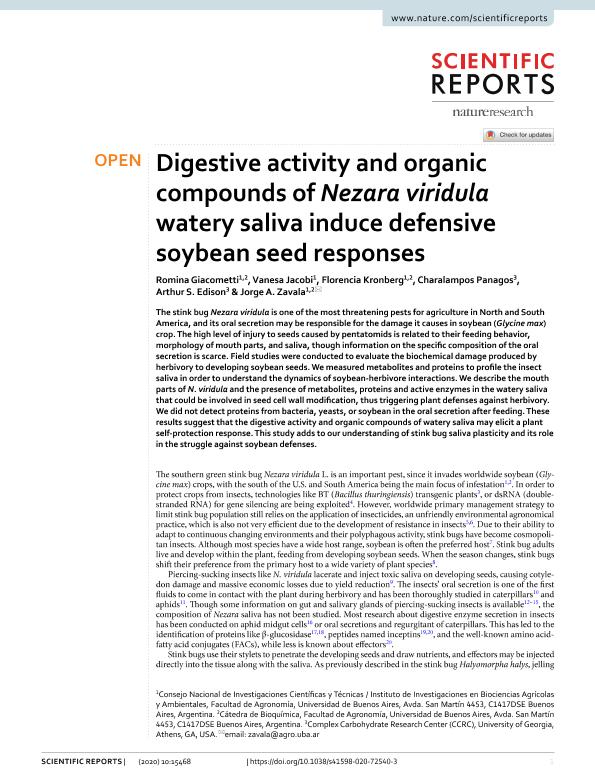Artículo
Digestive activity and organic compounds of Nezara viridula watery saliva induce defensive soybean seed responses
Giacometti, Romina ; Jacobi, Vanesa Gisela
; Jacobi, Vanesa Gisela ; Kronberg, Maria Florencia
; Kronberg, Maria Florencia ; Panagos, Charalampos; Edison, Arthur Scott; Zavala, Jorge Alberto
; Panagos, Charalampos; Edison, Arthur Scott; Zavala, Jorge Alberto
 ; Jacobi, Vanesa Gisela
; Jacobi, Vanesa Gisela ; Kronberg, Maria Florencia
; Kronberg, Maria Florencia ; Panagos, Charalampos; Edison, Arthur Scott; Zavala, Jorge Alberto
; Panagos, Charalampos; Edison, Arthur Scott; Zavala, Jorge Alberto
Fecha de publicación:
12/2020
Editorial:
Nature Research
Revista:
Scientific Reports
e-ISSN:
2045-2322
Idioma:
Inglés
Tipo de recurso:
Artículo publicado
Clasificación temática:
Resumen
The stink bug Nezara viridula is one of the most threatening pests for agriculture in North and South America, and its oral secretion may be responsible for the damage it causes in soybean (Glycine max) crop. The high level of injury to seeds caused by pentatomids is related to their feeding behavior, morphology of mouth parts, and saliva, though information on the specific composition of the oral secretion is scarce. Field studies were conducted to evaluate the biochemical damage produced by herbivory to developing soybean seeds. We measured metabolites and proteins to profile the insect saliva in order to understand the dynamics of soybean-herbivore interactions. We describe the mouth parts of N. viridula and the presence of metabolites, proteins and active enzymes in the watery saliva that could be involved in seed cell wall modification, thus triggering plant defenses against herbivory. We did not detect proteins from bacteria, yeasts, or soybean in the oral secretion after feeding. These results suggest that the digestive activity and organic compounds of watery saliva may elicit a plant self-protection response. This study adds to our understanding of stink bug saliva plasticity and its role in the struggle against soybean defenses.
Palabras clave:
SALIVA
,
NEZARA VIRIDULA
,
PROTEOMICS
,
SOYBEAN SEEDS
Archivos asociados
Licencia
Identificadores
Colecciones
Articulos(INBA)
Articulos de INST.DE INVEST. EN BIOCIENCIAS AGRICOLAS Y AMBIENTALES
Articulos de INST.DE INVEST. EN BIOCIENCIAS AGRICOLAS Y AMBIENTALES
Citación
Giacometti, Romina; Jacobi, Vanesa Gisela; Kronberg, Maria Florencia; Panagos, Charalampos; Edison, Arthur Scott; et al.; Digestive activity and organic compounds of Nezara viridula watery saliva induce defensive soybean seed responses; Nature Research; Scientific Reports; 10; 15468; 12-2020; 1-12
Compartir
Altmétricas



